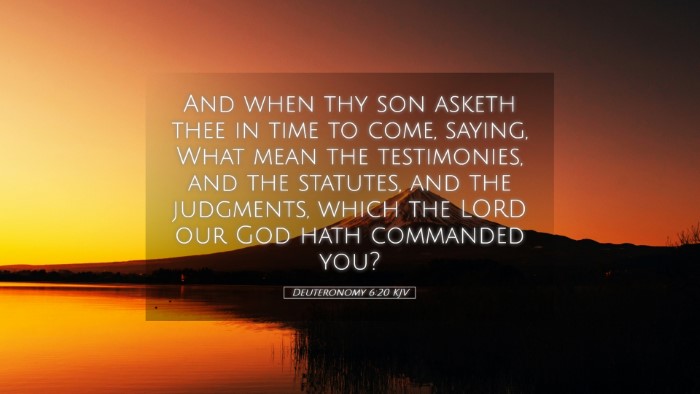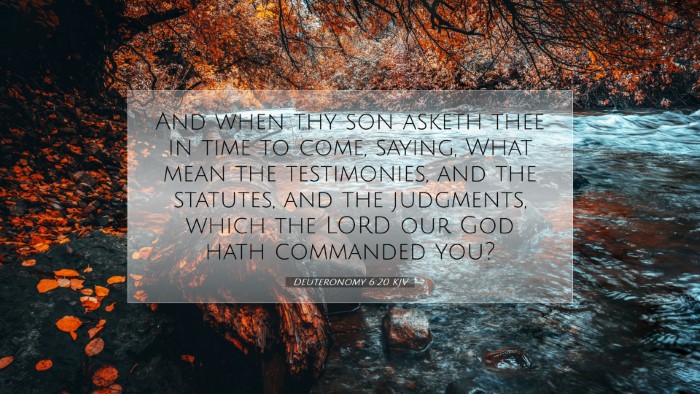Commentary on Deuteronomy 6:20
Verse: "When your son asks you in time to come, saying, What mean the testimonies, and the statutes, and the judgments, which the LORD our God hath commanded you?"
Introduction
This verse serves as a pivotal moment within the broader context of the Shema and the theological framework of the Israelite covenantal relationship with God. It underscores the importance of teaching and instilling knowledge of God's laws and acts in the hearts of the next generation. The inquiry of the son opens a door for generations to engage with and understand their faith actively.
Historical Context
The Book of Deuteronomy is fundamentally a restatement of the Law given to the Israelites. It is a reminder before they enter the Promised Land. The passage highlights the importance of oral tradition in Israelite culture, where future generations learn from the stories and statutes handed down from their ancestors.
Matthew Henry's Commentary
Matthew Henry emphasizes the significance of the questions raised by the children regarding the commandments of God. He argues that children should be educated in the faith, prompting them to ask questions that will lead to deeper understanding. Henry notes:
- Parental Responsibility: Parents are urged to communicate the significance of God’s laws, suggesting that evasion of these subjects leads to spiritual ignorance.
- Engagement Through Inquiry: Questions from children provide an opportunity for teaching and reinforcing the faith of parents and children alike.
Albert Barnes' Notes
Albert Barnes highlights the educational aspect of Deuteronomy 6:20, where the Jewish tradition places immense value on teaching children. The inquiry posed by the son is not merely a question; it is a catalyst for knowledge transfer.
- Comprehension of Commandments: Barnes notes that the commandments are explained as testimonies and judgments, indicating a God who is relational and wants His followers to understand His expectations.
- Response to Questions: Barnes emphasizes the importance of providing a thorough answer, reflecting on the mercies and works of God in history as part of the families' storytelling.
Adam Clarke's Commentary
Adam Clarke elaborates on the pedagogical importance of this verse. The questions of children serve to remind adults of their duties as educators in the faith.
- The Nature of Inquiry: Clarke suggests that the questioning nature reflects a desire to understand the divine commandments more deeply, aligning with the notion that God invites inquiry and relationship.
- Historical Contextualization: Clarke emphasizes connecting these inquiries with Israel’s history, illustrating God’s deliverance and providence.
Theological Implications
The inquiry in Deuteronomy 6:20 reflects the theological themes of covenant, revelation, and community. It reveals that understanding one’s faith is not only an academic exercise but deeply relational and communal.
- Covenantal Understanding: The father-son dialogue signifies the importance of passing down the covenantal promises and the significance of their obedience to God’s laws.
- Role of Memory: Faith formation within families is built upon memory, as they recount the testimonies of God’s past acts.
Practical Application
This passage serves as a clarion call for pastors, theologians, and educators in the church to prioritize the teaching of God’s commandments effectively. Practical applications include:
- Teaching Strategies: Develop programs that encourage active discussions about faith between parents and children.
- Parenting Workshops: Equip parents with resources to instil and discuss faith through storytelling and lived experiences.
- Catechism Training: Establish catechism practices that involve questioning and answering, emulating the natural curiosity of children about their faith.
Conclusion
Deuteronomy 6:20 encapsulates the heart of the Israelite tradition of faith formation through dialogue and teaching. It serves as a reminder that each generation is tasked with understanding and communicating the significance of God’s works and commandments to their offspring. The teachings derived from the commentaries of Henry, Barnes, and Clarke provide rich insights into the responsibilities that rest on the shoulders of the faith community to cultivate a loving and learned generation.


